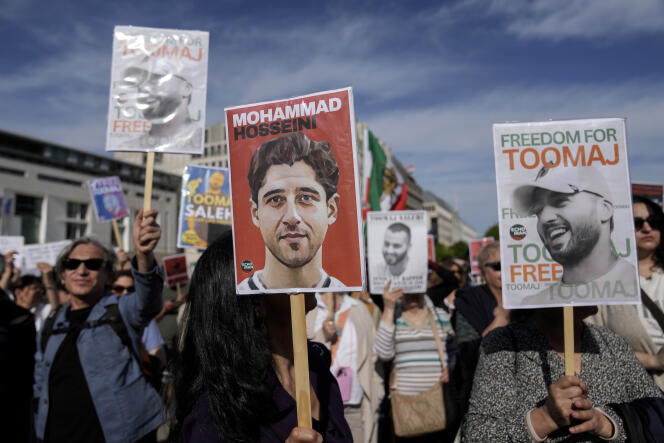


The death penalty handed down to Iranian rapper Toomaj Salehi, who has been the voice of the Woman, Life, Freedom protest movement has sparked outrage in the West. In France, the foreign ministry issued a statement strongly condemning the sentence, "which comes on top of the many other unjustifiable death sentences and executions linked to the protests in Iran in the autumn of 2022."
A large group of artists, writers, and human rights activists, including actress Golshifteh Farahani, cartoonist Marjane Satrapi, and singer Gaël Faye, wrote an op-ed Le Monde calling on French President Emmanuel Macron to act quickly to save the artist. The French rap scene, for its part, has yet to make a statement.
In the US, White House national security adviser Jake Sullivan also denounced the rapper's death sentence. "His voice amplifies the aspirations of the Iranian people and all those silenced by the regime. We call for his immediate release," he posted on X.
We strongly condemn the death sentence for Iranian rapper Toomaj Salehi. His voice amplifies the aspirations of the Iranian people and all those silenced by the regime. We call for his immediate release. #SaveToomaj.
— Jake Sullivan (@JakeSullivan46) April 27, 2024
The 33-year-old singer was first sentenced to death on April 24 for "corruption on earth," a charge frequently used by the Iranian regime against its opponents. The artist was also banned from leaving Iran for two years and performing any artistic activity. One of his lawyers, Amir Raisian, has announced his intention to appeal the sentence.
Salehi was arrested on October 30, 2022, after two months in hiding. At the time, Iran was gripped by the most powerful protest movement in the history of the Islamic Republic, following the death in September 2022 of the young woman Mahsa Amini after being taken into police custody for an appearance deemed "not Islamic enough." Like many young people in his country, Salehi took to the streets, calling for the overthrow of the Iranian regime. The rapper posted images and videos of himself in support of the ongoing uprising.
A few weeks after his arrest, the Iranian media published a video of the rapper, sitting on the ground, blindfolded, as he appeared to be trying to protect himself from a blow. He said he regretted his actions against the Iranian regime. For his supporters, there is no doubt that he had been tortured and forced to make these statements.
In November 2023, Salehi was released on bail after more than a year's imprisonment and several months spent in solitary confinement. The young Iranian did not choose silence. Taking advantage of this small moment of freedom, he reported in a video the torture he suffered while in detention and filed a complaint about it. He was arrested less than two weeks after his release, this time on charges of "lies" against the authorities. Like in many similar cases, no action was taken on his complaint of torture against his interrogators.
You have 34.41% of this article left to read. The rest is for subscribers only.
